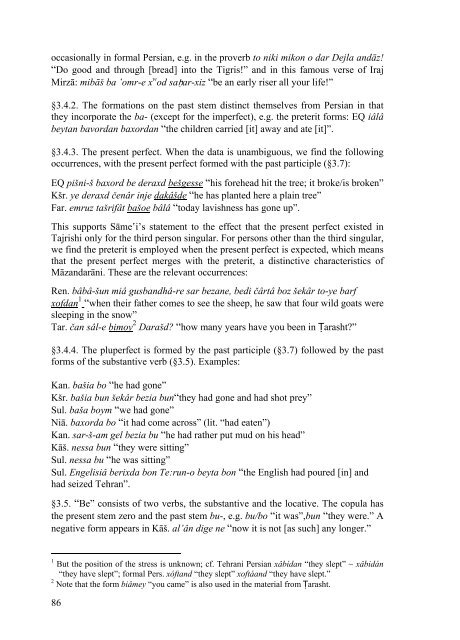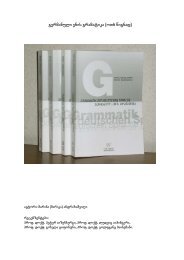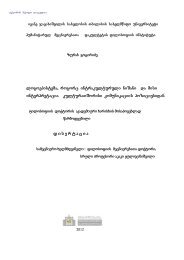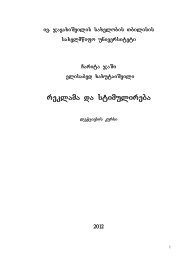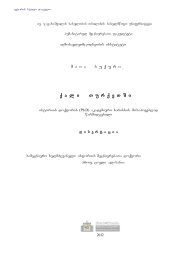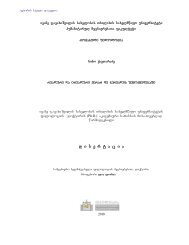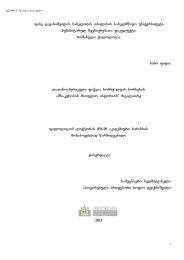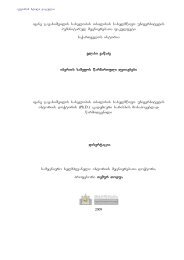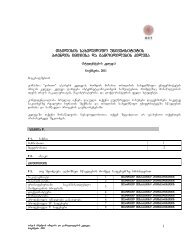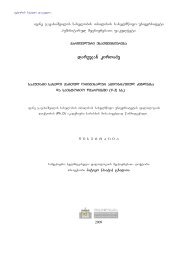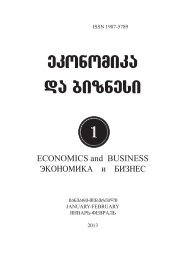issues of linguistics - Tbilisi State University
issues of linguistics - Tbilisi State University
issues of linguistics - Tbilisi State University
Create successful ePaper yourself
Turn your PDF publications into a flip-book with our unique Google optimized e-Paper software.
occasionally in formal Persian, e.g. in the proverb to niki mikon o dar Dejla andāz!<br />
“Do good and through [bread] into the Tigris!” and in this famous verse <strong>of</strong> Iraj<br />
Mirzā: mibāš ba ‛omr-e x w od saḥar-xiz “be an early riser all your life!”<br />
§3.4.2. The formations on the past stem distinct themselves from Persian in that<br />
they incorporate the ba- (except for the imperfect), e.g. the preterit forms: EQ iâlâ<br />
beytan bavordan baxordan “the children carried [it] away and ate [it]”.<br />
§3.4.3. The present perfect. When the data is unambiguous, we find the following<br />
occurrences, with the present perfect formed with the past participle (§3.7):<br />
EQ pišni-š baxord be deraxd bešgesse “his forehead hit the tree; it broke/is broken”<br />
Kšr. ye deraxd čenâr inje dakâšde “he has planted here a plain tree”<br />
Far. emruz tašrifât bašoe bâlâ “today lavishness has gone up”.<br />
This supports Sāme‛i’s statement to the effect that the present perfect existed in<br />
Tajrishi only for the third person singular. For persons other than the third singular,<br />
we find the preterit is employed when the present perfect is expected, which means<br />
that the present perfect merges with the preterit, a distinctive characteristics <strong>of</strong><br />
Māzandarāni. These are the relevant occurrences:<br />
Ren. bâbâ-šun miâ gusbandhâ-re sar bezane, bedi čârtâ boz šekâr to-ye barf<br />
x<strong>of</strong>dan 1 “when their father comes to see the sheep, he saw that four wild goats were<br />
sleeping in the snow”<br />
Tar. čan sâl-e bimoy 2 Darašd? “how many years have you been in Ṭarasht?”<br />
§3.4.4. The pluperfect is formed by the past participle (§3.7) followed by the past<br />
forms <strong>of</strong> the substantive verb (§3.5). Examples:<br />
Kan. bašia bo “he had gone”<br />
Kšr. bašia bun šekâr bezia bun“they had gone and had shot prey”<br />
Sul. baša boym “we had gone”<br />
Niā. baxorda bo “it had come across” (lit. “had eaten”)<br />
Kan. sar-š-am gel bezia bu “he had rather put mud on his head”<br />
Kāš. nessa bun “they were sitting”<br />
Sul. nessa bu “he was sitting”<br />
Sul. Engelisiâ berixda bon Te:run-o beyta bon “the English had poured [in] and<br />
had seized Tehran”.<br />
§3.5. “Be” consists <strong>of</strong> two verbs, the substantive and the locative. The copula has<br />
the present stem zero and the past stem bu-, e.g. bu/bo “it was”,bun “they were.” A<br />
negative form appears in Kāš. al’ân dige ne “now it is not [as such] any longer.”<br />
1 But the position <strong>of</strong> the stress is unknown; cf. Tehrani Persian xâbídan “they slept” ~ xâbidán<br />
“they have slept”; formal Pers. xóftand “they slept” x<strong>of</strong>táand “they have slept.”<br />
2 Note that the form biâmey “you came” is also used in the material from Ṭarasht.<br />
86


